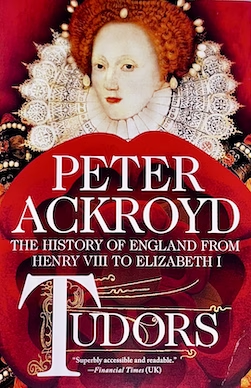This book review of Tudors by Peter Ackroyd is part of my World History Reading Quest.
This post pay contain affiliate links, which means that I may receive a commission if you make a purchase using these links. As an Amazon Associate I earn from qualifying purchases. Thanks for helping to support the content on this site.

Tudors: The History of England from Henry VIII to Elizabeth I
- Author: Peter Ackroyd
- Series: History of England, Volume 2
- Genre: Non-Fiction, History
- Publisher: St. Martin’s Griffin
- Pages: 528 pages, Paperback
This would be entirely consistent with a reformation that was less about the assertion of faith and principle than about the redistribution of power and wealth.
Peter Ackroyd, Tudors
I love the Tudor era. The stories of power, betrayal, and ambition. I don’t give a crap about real housewives, but this type of intrigue can captivate me for hours. The events that took place in this era are ready-made for gripping historical drama. Henry VIII and his six wives, Elizabeth I’s rise to power, and the dramatic changes that shook England during this period – these are some of the most captivating chapters in world history.
Coming off of Peter Ackroyd’s Foundation, I had had really high hopes for the second installment in his History of England series. Overall, I really enjoyed Tudors and it confirmed that I really enjoy Peter Acrkoyd’s work in this series. That said, I was a little disappointed that Ackroyd didn’t continue with some of the compelling stories and narrative elements that he used so effectively in Foundation. While Ackroyd certainly brings a lot of historical detail and rich information to the table, this book didn’t emotionally connect with me in the same way. In this book it feels like Ackroyd focused a bit more on facts and historical context. While that’s not necessarily a bad thing, it left me feeling like I was reading a well-researched textbook rather than a compelling narrative about one of England’s most famous royal families.
In this review, I’ll share my thoughts on the strengths and weaknesses of The Tudors and reflect on what worked for me—and what didn’t.
Historical Context
The Tudors gives a fairly expansive account of the Tudor family. It focuses on the reigns of Henry VIII, his children (Edward VI, Mary I, and Elizabeth I), as well as the political, social, and religious upheaval that took place during the era. Ackroyd covers everything important from the era – Henry’s break with the Catholic Church, his marriages, and the religious wars that followed, as well as Elizabeth’s sometimes turbulent rule.
Rather than a chronological, story-driven narrative, Ackroyd’s approach is more thematic. He moves between different aspects of the Tudor dynasty—religious conflict, court politics, personal relationships—while offering a comprehensive look at the events that shaped the era. I found this structure effective for providing a broad understanding of the period, though at times it can feel a little disconnected.
In terms of content, The Tudors is dense with facts and insights. Which isn’t necessarily a bad thing. Ackroyd examines the Tudor family through the lens of power, religion, and the constant power struggles for the throne.
My Review
Author’s Style and Approach
I really enjoyed Peter Ackroyd’s Foundation, the first book in this series. His writing is meticulous, packed with facts and historical context that really adds a lot to those looking to learn and contextualize the well-known stories of the era. But unlike the first book, this book reads more like a textbook. To me he shifted somewhat to a more academic tone that focuses heavily on the details of the era—whether it’s the political structure of Tudor England or the intricacies of the English Reformation. While I appreciated the depth of the research, the dry, almost clinical approach made it harder at times to emotionally engage with the story (which, I recognize isn’t necessarily the point of a book like this).
Ackroyd’s tone is generally formal, and this works well when discussing political shifts or the religious upheavals of the time. But when it comes to the more personal, human elements of the Tudor family—Henry’s six wives, the tension between Elizabeth and Mary—I felt the emotional weight was missing. The events are described with precision, but there’s little exploration of the inner lives of the characters involved. Instead, I felt like the narrative too often felt like a list of events rather than an exploration of the personalities and emotional dynamics that shaped those events.
Strengths
First and foremost, I really appreciate Ackroyd’s deep research in this book. It’s impressive. Whether it’s the political machinations behind Henry VIII’s break from Rome or the intense religious conflicts that dominated the era, Ackroyd’s knowledge feels quite impressive.
I also appreciated the way Ackroyd explored the broader historical context. Instead of just focusing on the internal impact of the monarchs in England, he also looks at the global implications of an emerging imperial power. For example, he looks at the global implications of the English Reformation and how the religious shifts in England affected European politics. These broader perspectives added depth to the book and made the period feel larger and more interconnected with world history.
Another strength of the book is its coverage of Elizabeth I. Ackroyd gives considerable space to her reign, presenting her as a calculating and powerful monarch. He offers a nuanced look at Elizabeth’s role in both the political and cultural life of England, highlighting her strategic intelligence and the challenges she faced as a woman on the throne.
Weaknesses
While the depth of research is a clear strength, it’s also one of the book’s main weaknesses. The Tudors is packed with facts, but the drop-off in personal storytelling from Foundation sometimes left me feeling like I was reading a history textbook. For such a passionate period of time, I think I wanted to harness a little more of the passion, the rivalry, and the drama of the time. Instead, Ackroyd was a little more clinical in his approach, which just felt more detached.
Relatedly, I felt like an emotional dimension of the Tudor family was mostly missing. While Ackroyd certainly explores the political and religious turmoil of the time, I found myself wishing he dove more deeply into the personal lives and humanity of the people. For example, Henry VIII’s marriages and his drastic decisions—such as breaking from the Catholic Church to marry Anne Boleyn—we never get a true sense of humanity of these folks, which I was looking for a little more of.
Target Audience
Tudors is best suited for readers who are interested in history and are already familiar with the basics of the Tudor dynasty. If you’re looking for a deep dive into the political, social, and religious aspects of the period, this book will give you a thorough, well-researched overview. However, if you’re someone who enjoys historical fiction or narrative-driven nonfiction, The Tudors might feel a bit dry and impersonal.
For those who want to understand the broad historical context of the Tudor era without focusing too much on character development or personal drama, Ackroyd’s book will be satisfying. But if you’re seeking a more engaging, character-driven story about Tudors like Henry VIII, you might want to try a different book, like Margaret George’s The Autobiography of Henry VIII.
Personal Reflection
I wasn’t always interested in this period of history or monarchy in general. My wife was way more interested in Tudors and English monarchy than me, until recently. Though I think we did watch Tudors for a while back in the day and I might have enjoyed that. For whatever reason, English and British monarchical history never stuck with me. But, it was Peter Ackroyd’s Foundation, Volume 1 of his History of England series that got me hooked and really curious. It engaged me in the topic way more than I had been previously. And overall, this book continued to grab my attention, leaving me with so many more questions than answers.
Parting Thoughts
In the end, Tudors is a well-researched, factual account of one of the most fascinating dynasties in history. It excels in providing a detailed overview of the era, from the rise of Henry VIII to the reign of Elizabeth I. If you’re looking for an insightful, thorough examination of the period, Ackroyd’s book is a solid choice. But if you’re hoping for a more engaging, character-driven story, you might find yourself disappointed.
I’m curious to hear from others who’ve read Tudors. Did you find it as informative as I did, or did you struggle with its academic tone? Did you wish for more character-driven storytelling, or were you content with the historical analysis? Share your thoughts in the comments—I’d love to hear different perspectives!
Other Books You Might Enjoy
- Book Review of Foundation by Peter Ackroyd
- Book Review of Columbus: The Four Voyages by Laurence Bergreen
About the Author
Peter Ackroyd is a British writer known for his wide-ranging work in fiction, biography, and history. He was born on October 5, 1949, in London and grew up with a love for literature and storytelling. After studying at Clare College, Cambridge, and Yale University, he started his career as a writer and editor. Ackroyd gained early recognition with his novel Hawksmoor (1985), which won the Whitbread Award and the Guardian Fiction Prize. He is famous for his deep dives into English history, writing books like London: The Biography and Foundation: The History of England. Ackroyd has also written biographies of major figures like Charles Dickens, T.S. Eliot, and Sir Isaac Newton. Over his career, he has won several awards, including the Somerset Maugham Award and the James Tait Black Memorial Prize. Known for his rich, atmospheric writing, Ackroyd continues to be celebrated as one of England’s leading literary voices.
Reading Details
Start date: November 13, 2024
Finish date: November 16, 2024


